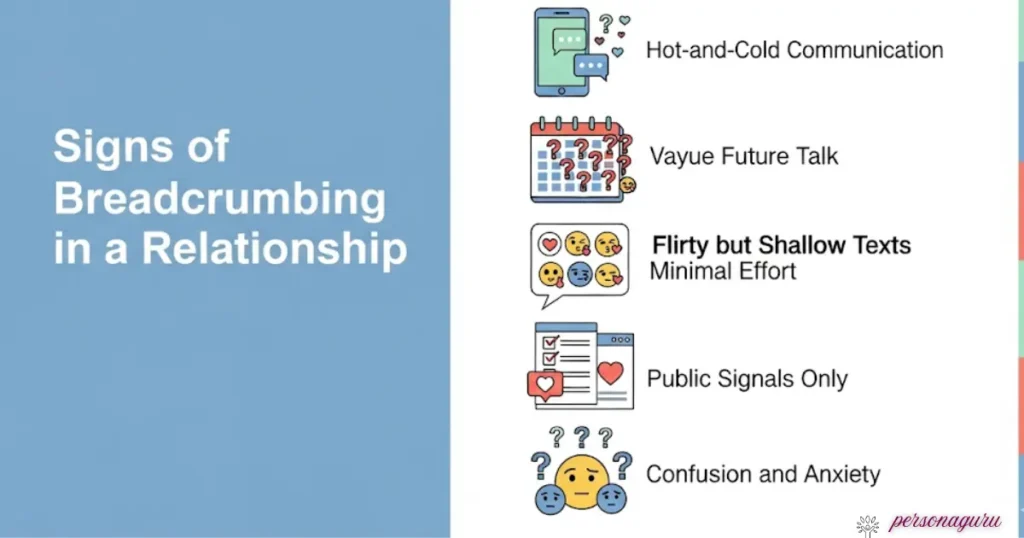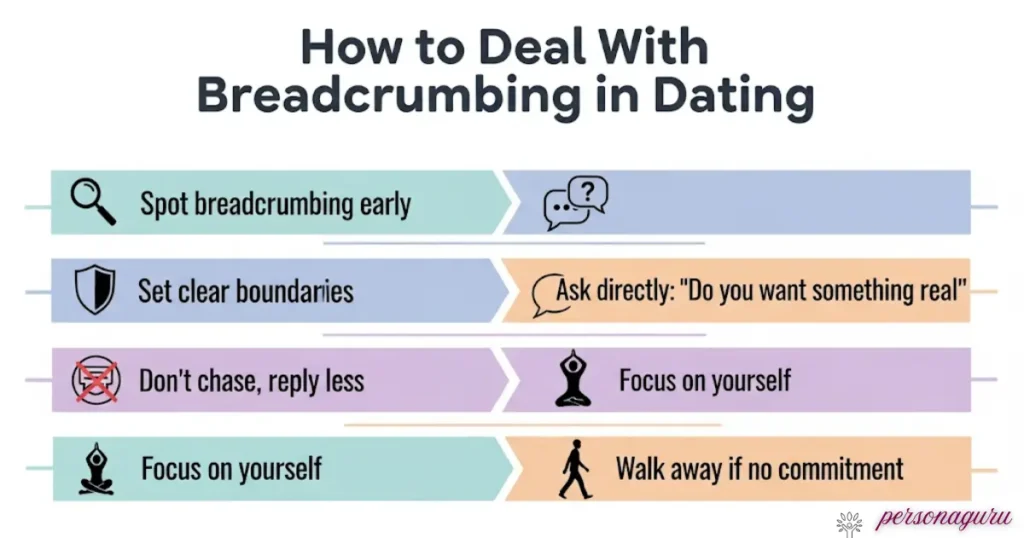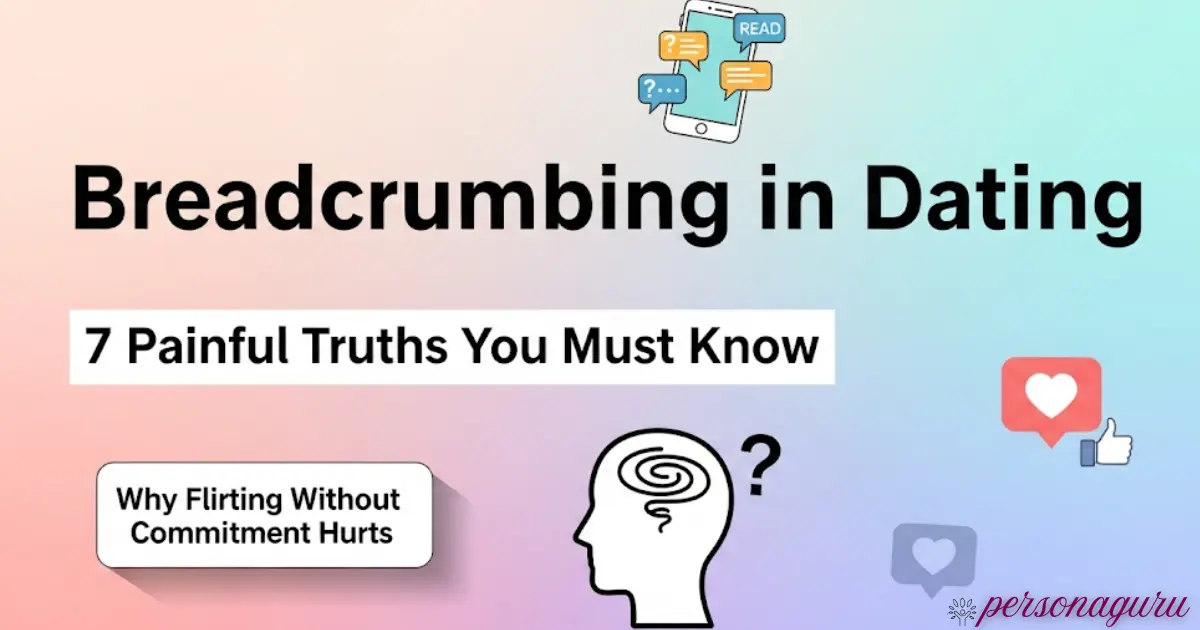Last updated on February 6th, 2026 at 10:25 am
Ever Wonder Why Someone Flirts but Never Commits? Picture this—you get a flirty text out of the blue saying, “Hey stranger, miss you 😉.” Your heart races, and you reply. But soon, the conversation just dies out. Then, a few days later, they like your Instagram story—but still don’t ask to meet up.
This confusing back-and-forth is called breadcrumbing in dating. It’s when someone gives you just enough attention to keep you hooked but has no real plans to build a relationship.
In today’s world of dating apps and social media, breadcrumbing in dating is becoming more and more common, leaving many people feeling stuck and unsure about where they stand. A 2025 study in the Journal of Social and Personal Relationships found 38% of daters under 30 have experienced it, up from 28% in 2023, often more than ghosting.
What is Breadcrumbing in Dating?
Breadcrumbing meaning in dating:
When someone leads you on with small signs of interest (texts, likes, compliments), but never commits to something real.
🔹 Think of it like tossing breadcrumbs—you keep following, hoping for more, but never get a full meal.
Psychologists call it a form of “intermittent reinforcement”—you never know when you will get the next “crumb,” which makes you crave their attention even more.
A 2025 Psychology International study shows it’s common in India, with 42% of online daters experiencing it due to anxious attachment. Unlike flirting, breadcrumbing in dating is manipulative, often unintentional but harmful.
Dr. Ramani Durvasula says, “It’s a power play that leaves you doubting yourself.”
What are the Signs of Breadcrumbing in a Relationship
Here are the red flags that someone is breadcrumbing you:
- Hot-and-cold communication – They disappear for days, then randomly pop up.
- Vague future talk – “We should hang out sometime,” but plans never happen.
- Flirty but shallow texts – Compliments, emojis, or late-night “hey you” messages.
- Minimal effort – They don’t ask about your life deeply, only surface-level chats.
- Public signals only – Likes and story reactions, but no private effort.
- You feel confused – Excited when they reach out, but anxious when they pull back.
👉 If these feel familiar, you might be dealing with breadcrumbing in dating. A 2025 Match.com survey found 35% of app users spot these signs monthly.

How Does Breadcrumbing Differ from Ghosting and Benching?
Dating trends often overlap, but here’s a quick comparison table:
| Behavior | What It Looks Like | Main Intention | Emotional Impact |
| Ghosting | Suddenly cutting all contact | Avoid confrontation | Shock, confusion |
| Benching | Keeping you “on hold” while exploring others | Backup option | Frustration, low priority |
| Breadcrumbing | Small signs of interest with no commitment | Control, ego boost | Hope mixed with anxiety |
In 2025, breadcrumbing in dating affects 40% more people than ghosting, per recent data.
Why Do People Breadcrumb? (Psychology Behind It)
Breadcrumbing isn’t always about cruelty—sometimes it’s unconscious. Common reasons include:
- Fear of commitment – They like attention but not responsibility.
- Low self-esteem – Keeping admirers boosts their ego.
- Backup plan – You are the “just in case” option.
- Power dynamics – They enjoy controlling how much attention you get.
- Avoiding loneliness – They are not serious, but they don’t want to be alone.
A 2025 study links it to narcissistic traits, with 25% of online daters showing this behavior.
What is the Emotional Impact of Breadcrumbing
Breadcrumbing in dating hurts. You might feel:
- Confused about where you stand.
- Low self-worth, wondering “Am I enough?”
- Anxious waiting for their next move.
- Stuck, unable to let go.
A 2025 report says it lowers self-esteem by 15% and increases loneliness in 30% of cases. Research suggests that people who have been breadcrumbed tend to feel more lonely, more helpless, and less satisfied with life.
How to Deal With Breadcrumbing in Dating
If it’s happening, try this:
- Spot the pattern early and note it down.
- Set clear boundaries on what you’ll accept.
- Don’t chase—reply less to break the cycle.
- Ask directly, “Do you want something real?”
- Focus on yourself with hobbies or friends.
- Walk away if they don’t step up.
A 2025 expert tip: 70% of people feel better after cutting contact.

Breadcrumbing in the Digital Age (2025 Trends)
TeIn 2025, technology fuels it:
- AI chatbots send flirty texts, up 20% this year.
- Social media likes and comments keep you hooked.
- Dating apps lead to 30% validation swipes, not dates.
RELATED: Top Impacts of Social Media on Communication
How to Protect Yourself from Breadcrumbing
- Trust patterns, not words. Look at their consistency, not just sweet texts.
- Value your time. If they can’t commit to a plan, don’t keep waiting.
- Seek clarity. Ask them where things are going—don’t be afraid of the answer.
- Know your worth. Healthy love feels secure, not confusing.
Conclusion
Breadcrumbing in dating is more than just a few mixed signals—it’s an emotionally draining pattern that can keep you stuck in false hope.
By learning to spot the signs early, understanding the psychology behind it, and setting clear boundaries, you can protect your self-worth and open the door to healthier relationships.
👉 Real love doesn’t confuse you. It makes you feel secure, valued, and respected. Don’t settle for crumbs when you deserve the whole meal.
FAQs
1. Is breadcrumbing the same as flirting?
No. Flirting can be playful but often leads to something real. Breadcrumbing keeps you stuck without progress.
2. Can breadcrumbing turn into a relationship?
Rarely. Unless the person changes their behavior and becomes consistent, breadcrumbing usually doesn’t lead to commitment.
3. How do I know if I’m being breadcrumbed?
If their actions are inconsistent, they give attention only when convenient, and you constantly feel unsure—it’s likely breadcrumbing.
4. Why does breadcrumbing hurt so much?
Because it creates hope. The “crumbs” make you believe more is coming, but the cycle keeps you emotionally trapped.

